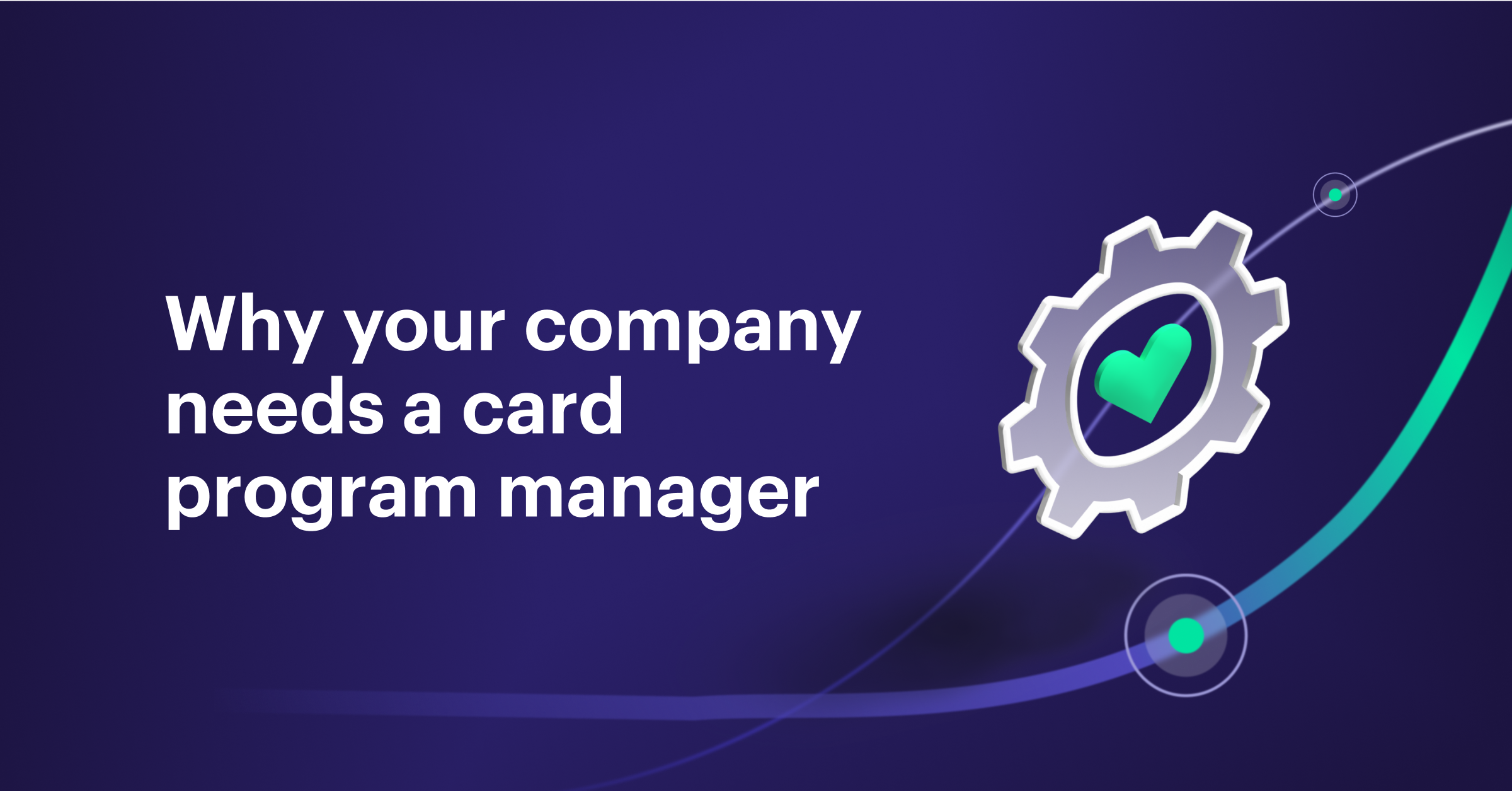Launching a new card program can be a significant milestone for any growth-stage company, offering opportunities for scale, increased customer engagement, and enhanced financial capabilities. But navigating the complexities of such an undertaking requires careful planning, coordination, and deep understanding of a complex ecosystem. This is where a program manager becomes an indispensable asset for companies venturing into the realm of card programs.
A program manager plays a crucial role in fostering customer loyalty through effective card program management, helping businesses drive repeat purchases and remain competitive.
So what exactly is a program manager, and why can working with one be so valuable? Let’s run through some of the key reasons why a program manager is essential for success.
What is card program management?
Card program management involves designing and overseeing programs for various card types, like debit, prepaid, or credit cards. A program manager works with various entities involved in a card program, such as banks, card networks, card fulfillment vendors, and other partners to ensure the program is running optimally. Program managers also help ensure card programs are compliant with regulations through comprehensive compliance reporting.
It is crucial for program managers to maintain a direct relationship with the issuing bank to ensure effective compliance and operational management. They can manage processes such as disputes, monitor programs for fraudulent activity through rigorous fraud management and transaction monitoring systems, provide reporting and analytics, and can help provide customer support for cardholders. Additionally, the issuer processor plays a vital role in connecting banks to card networks, processing transactions, and managing compliance.
Key benefits of a card program manager
Strategic planning and execution
A program manager brings a strategic mindset to the table, helping businesses develop comprehensive plans for their card programs. This involves identifying an organization’s goals, defining KPIs and success metrics, and creating a roadmap that aligns with a company’s overall business strategy. The ability to translate high-level goals into actionable steps is crucial for a successful launch, and a program manager is there to break down complex projects into manageable tasks. Effective strategic planning and execution by experienced professionals are essential for overall program success.
Management of partnerships
Launching a card program involves collaboration across various entities, including sponsor banks, card networks, or other third-party partners. A program manager works with key partners within the payments value chain to deliver effective payment solutions and ensure compliance with industry standards. A program manager serves as a central point of contact, fostering collaboration with these entities and managing them on a business’ behalf. This helps ensure that everyone is on the same page, working towards a common objective, and addressing potential challenges before they escalate.
Risk management
Card programs can come with inherent risks, whether they are related to regulatory compliance, technological glitches, or unexpected market shifts. A program manager is adept at identifying potential risks, developing contingency plans, and implementing risk mitigation strategies. This can include the use of transaction monitoring systems that leverage rules and machine learning to identify, flag, and potentially block suspicious activity. By proactively addressing challenges, a program manager helps minimize disruptions and ensures a smoother launch process.
Timeline and resource management
Time is of the essence in the competitive payments landscape. Efficiently managing the infrastructure necessary to process payments is crucial for success. A program manager excels in creating and managing timelines, setting realistic milestones, and optimizing resource allocation. This efficiency is critical for organizations with limited resources, helping them make the most of their time and budget to meet deadlines and deliver a high-quality card program to the market.
The successful launch of a new card program can be a game-changer for businesses. With the multifaceted challenges involved, having a dedicated program manager is advantageous – even essential – to run a successful card program. As companies strive for innovation and growth, a program manager can be a key ally in turning aspirations into tangible results. Learn more about how program managers can help your organization in our guide, Abstracting complexity: how to navigate the payments ecosystem with confidence.
Key Components of Card Program Management
Card program management involves several key components that are essential for a successful program. These components can include:
- Program Strategy: helping developing a clear program strategy that aligns with the organization’s goals and objectives.
- Program Operations: Collaborating on how to manage the program’s day-to-day operations, including customer service, transaction processing, and risk management.
- Compliance and Risk Management: Helping to ensure compliance with regulatory requirements and managing risk to minimize potential losses.
- Customer Acquisition and Retention: Helping to develop strategies to acquire and retain customers, including marketing, loyalty programs, and customer service.
- Program Analytics and Reporting: Monitoring and analyzing program performance, including transaction volumes, customer acquisition costs, and customer retention rates.
Enhancing Customer Experience through Card Program Management
Card program management plays a vital role in enhancing customer experience. By helping to provide a seamless and secure payment experience, card program managers can potentially increase customer satisfaction and loyalty. Strategies to enhance customer experience include:
- Personalization: Offering personalized services and rewards to customers based on their preferences and behavior.
- Convenience: Providing convenient payment options, including mobile payments and contactless payments.
- Security: Helping ensure the security of transactions and customer data to minimize the risk of fraud and identity theft.
- Rewards and Loyalty Programs: Offering rewards and loyalty programs to incentivize customers to use the card program. (Keep keywords: card program managers, program managers, card program, program management)
Takeaways
A well-executed card program requires more than just great technology—it needs strong leadership, coordination, and strategic oversight. A dedicated program manager can help ensure that all moving parts align, risks are mitigated, and business objectives are met efficiently.
If your company is launching or optimizing a card program, having a program manager can help build a strong sense of loyalty and community with your customers.
Learn how Marqeta can help streamline your program’s success today!

